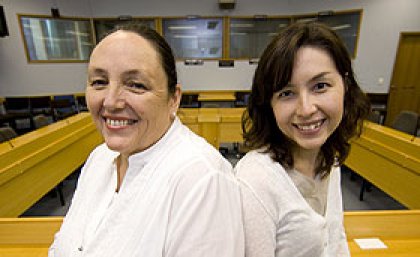
Not many mothers can say they share university classes with their daughter, but UQ postgraduate Victoria Oyama is one of them.
Ms Oyama and her daughter Akane have both recently commenced the Master of Arts Japanese Interpreting and Translation (MAJIT) program at St Lucia, and share a goal to sharpen their skills in both English and Japanese.
Victoria is Australian by birth but moved to Japan when she was 18, and ended up staying three decades, eventually teaching herself Japanese completely through immersion.
Upon her return to Australia in 2004, she decided to “put the cart before the horse” by enrolling in a Bachelor of Arts majoring in Japanese after attaining the highest level in a language proficiency exam.
She said the decision to tackle postgraduate study at UQ was because of the international reputation of the translation degree, which takes two years to complete full-time.
“I heard that MAJIT was one of the top programs in the world for acquiring the official NAATI (official translation) qualification,” she said.
The program is only one of two of its kind in the world, and the only one in the Southern Hemisphere ranked by the Swiss-based AIIC (International Association of Conference Interpreters).
Students become familiar with legal, business and even medical language, and in their final year participate in weekly live forums where they interpret for a guest speaker in real-time.
At the end of her studies, Victoria hopes to achieve a NAATI qualification, and plans to put her skills to good use in Australia or Japan.
“I also hope that I will have created many lovely memories of my time here at UQ together with many lasting friendships,” she said.
For Victoria’s daughter Akane, the situation is reversed. Acquiring Japanese as her native language, she developed her English skills from her mother during childhood, further building on these through Japanese public schooling, undergraduate studies in Australia and work experience.
“MAJIT is such a well known translation and interpreting course around the world that at first, I was thinking that the level of study would be too high,” Akane said.
“However, while I worked as an in-house translator and interpreter at one of Japan's car makers, I strongly felt the need to improve my translation and interpreting skills and to undertake a systematic and thorough training at an early stage.”
Akane said that she hoped to refine her Japanese and English translation and interpreting skills and looked forward to completing her Masters with her mother.
Media: Wendy Burford at UQ Arts (07 3346 7898, w.burford@uq.edu.au) or Cameron Pegg at UQ Communications (07 3365 2049, c.pegg@uq.edu.au)
.jpg)



